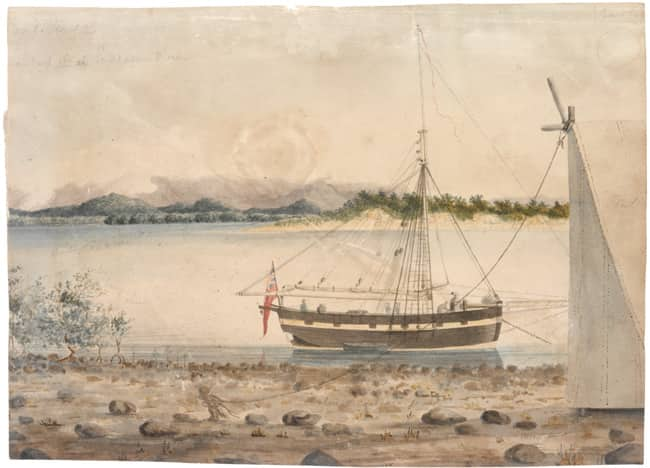James Hunter R. N.,
Convict Ship Surgeon-Superintendent
Date of Seniority Royal Navy 3 October 1814
James Hunter was employed as Surgeon-Superintendent on three convict ship voyages to Australia:
-
Minerva in 1818
-
Prince Regent in 1820
-
Princess Royal in 1823
Mermaid Expedition 1820
After the voyage of the Prince Regent in 1820 James Hunter offered his services to Philip Parker King who was in need of a surgeon to join his third expedition on the Mermaid. King was grateful for the presence of an experienced surgeon on the expedition......I accepted the proffered services of a young man who was strongly recommended by his Excellency the Governor, and he was on the point of joining me, when a surgeon of the navy, Mr. James Hunter, who had just arrived in charge of a convict ship, volunteered his services, which were gladly accepted, and he was immediately attached to the Mermaid’s establishment. The accession of a surgeon to our small party relieved me of a greater weight of anxiety than I can describe; and, when it is considered that Mr. Hunter left an employment of a much more lucrative nature, to join an arduous service in a vessel whose only cabin was scarcely large enough to contain our mess-table, and which afforded neither comfort nor convenience of any description, I may be allowed here to acknowledge my thanks for the sacrifice he made. [1]
While Captain King was grateful for James Hunter's service perhaps the surgeon was equally thankful to join such an exciting voyage of discovery with Captain King, Allan Cunningham and John Septimus Roe.
They departed Sydney on 13 July 1820 fitted out with provisions and every other requisite for a voyage of eight months duration. [2]
On 20th July at Port Bowen, James Hunter and explorer Allan Cunningham spent the day ranging about the vicinity of the shore whilst Mr. Roe with a boats crew was employed in filling empty water casks from a gully at the back of the beach. [1]
A week later they were at the Endeavour River (north of Cooktown)....Captain King referred to James Hunter in his journal.......
Mr. Hunter our Surgeon had armed himself on the beach with his gun during my absence and had shot several birds consisting chiefly of cockatoos, pigeons, green thrushes and a large bird with brown speckled plumage and a long tail of the pheasant type evident from the construction of the feet and bill. [3]
The expedition returned to Sydney early because of damage to the Mermaid and also because of the health of those on the expedition. They had suffered under harsh rocky conditions on shore while exploring and gathering water.....
Mr. Hunter the surgeon, ascended a hill to examine the country. But after all his fatigue he did not see much. The view was such as might be seen form any rock elevation; that is, rocky square shaped mountains and sterile desert.[4]
The men suffered with sores on their feet and legs from their on-shore expeditions scrambling over the heights; and the red glare had invalided a good many by causing ophthalmia. These were serious obstacles, and combined with the fact of the rainy season approaching, had the effect of putting an end to the survey for a time.

Image: Mermaid at anchorage in Endeavour River, 1819 Phillip Parker King Watercolour - State Library of NSW
Medical Board of Enquiry
In August 1820 James Hunter was appointed to a Medical Board of Enquiry to investigate and report on the qualifications of certain persons who were practising surgery and medicine without qualifications.Princess Royal 1823
He returned to England on the Shipley early in 1821 and was appointed Surgeon-Superintendent on the convict ship Princess Royal in 1822. The Princess Royal departed England on 5 November 1822 and arrived in Port Jackson on 9 March 1823.Departure from the Colony
In correspondence dated 23 February 1824, James Hunter was notified that he had been appointed surgeon to the troops (48th regiment) who were departing on the Asia for Madras. [5] Other ships departing for Madras included Greenock and Sir Godfrey Webster. They departed for Madras mid March 1824. [6]In June news was received in the colony of the dreadful fate of the 48th Regiment. They had arrived in India at the hottest season ever known by the oldest inhabitant, there not having been rain for more than 9 months and in consequence nearly 70 of the strongest soldiers died, besides a far greater number of women and children. . [7]
Notes and Links
Phillip Parker King, Royal Naval Biography by John Marshall - Voyages of the MermaidReferences
[1] Narrative of a Survey of the Intertropical and Western Coasts of ..., Volume 1 By Phillip Parker King. p. 347[2] H.R.A., vol. X, p.370
[3] New South Wales, Australia, Colonial Secretary's Papers, 1788-1856 Series: NRS 898; Reel or Fiche Numbers: Reels 6020-6040, 6070; Fiche 3260-3312 Title: Special Bundles, 1794-1825
[4] Narrative of a Survey of the Intertropical and Western Coasts of ..., Volume 1 By Phillip Parker King. p.292.
[5] Australia, Colonial Secretary's Papers, 1788-1856, Copies of Letters Sent Within The Colony, 1814-1827
[6] The Sydney Gazette and New South Wales Advertiser (NSW : 1803 - 1842) Thursday 18 March 1824 p 2
[7] Hobart Town Gazette and Van Diemen's Land Advertiser (Tas. : 1821 - 1825) Fri 3 Dec 1824
↑
